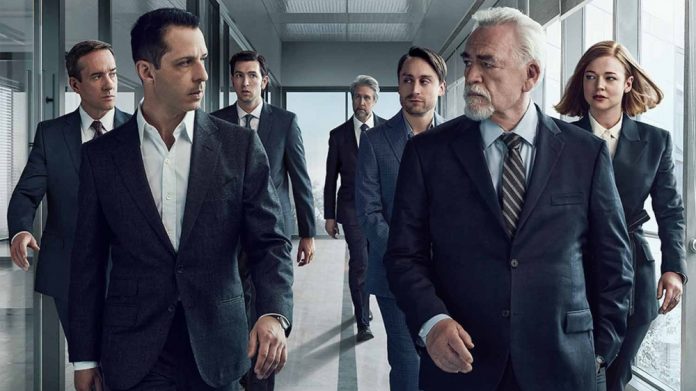Mark Mylod hopes that HBO’s Succession was not a once-in-a-lifetime experience, an epic constellation in which all the creative pieces came together for him like no other, but if it turns out to be, I imagine he’ll still be grateful.
Mylod is still savoring the recognition Succession received from Emmy voters for its fourth and final season, which earned a staggering 27 Emmy nominations, including one for Outstanding Drama Series in addition to an individual nod for directing. He’s up against two other Succession directors, Lorene Scafaria and Andrij Parekh, so the show secured nearly half of the category’s seven nominees.
Season 4 of Succession ultimately reveals who takes over Logan Roy’s media empire Waystar-Royco following his shocking death during the season’s third episode. Brian Cox is up for another Emmy this year for his turn as Logan, and so are the four actors playing his children — Jeremy Strong, Sarah Snook, Kieran Culkin, and Alan Ruck.
Mylod is a British-born director who started off at the BBC before going on to direct major series such as Game of Thrones, Entourage, Shameless, and last year’s acclaimed film The Menu. He is responsible for directing 16 of Succession‘s 39 episodes, including the season finales of each of its four seasons.
Above the Line caught up with Mylod by phone from his home base in Brooklyn. Our in-depth conversation revealed which Season 4 scene brought him to tears, how he found a portal for genuine emotional reactions from the show’s characters, and the tremendous sense of responsibility and pressure he felt to deliver a series finale that did justice to the show.
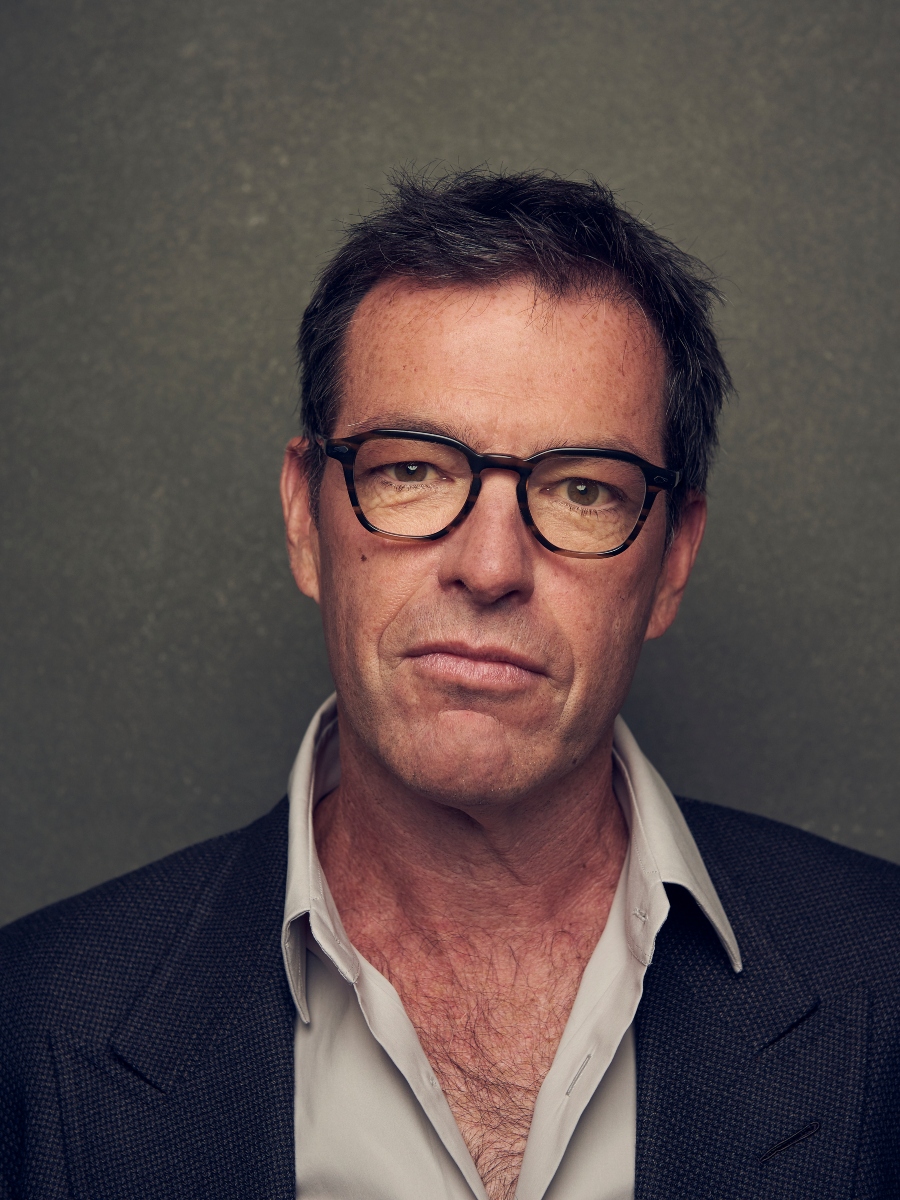
Above the Line: The fourth and final season of Succession earned 27 Emmy nominations, with three directing nominees, including yourself. How are you feeling about this recognition from your peers?
Mark Mylod: Just delighted, obviously. I’m so proud, particularly with the scope across so many departments, and even more specifically to see Sarah [Snook] nominated for lead actress. I think her work, and everybody’s work this season, has been phenomenal, but Sarah’s has just been off the charts.
To see Kieran [Culkin] nominated for lead actor, I’m so proud of him and happy for him. Perhaps most of all to see Alan Ruck nominated for supporting actor. Apart from the fact that Alan is truly one of the loveliest, most generous actors I’ve ever worked with.
Jesse [Armstrong] and I have often felt a little guilty; we feel we’ve underserved him by necessity in the final edit, sometimes, by having to focus on another strand of the story. So to be able to have Alan’s character, Connor, kind of front and center and so pivotal to the emotional trajectory of Season 4 was fantastic. And, of course, Alan rose to that beautifully with some of my favorite moments of the season.
ATL: Which were?
Mylod: Well, specifically, there are two moments that come directly to mind in Episode 2 — there’s this scene where he just tells his siblings that they’re just too emotionally needy. He says that his superpower is that he’s a cactus. He can survive in the desert without love. It was so incredibly poignant and had such emotional truth to it. And Alan’s performance of it had this combination of this extraordinary kind of weariness and yet [the] authority to it of somebody who has lived that truth for decades and has not quite found their peace with it.
I found that profoundly moving, and perhaps even more so with Episode 3, “Connor’s Wedding,” which I did direct. Working with him on that, when his siblings go up and first tell him that Logan is perhaps dead, his reaction to that [is], “Well, is he or isn’t he? He [Logan] never really liked me,” and [then he delivers] an immediate kind of retraction and apology for making himself the center of the conversation for a moment, and [it] was delivered with such poignance, and such emotional truth. I remember being at the monitor at that moment just with my jaw on the floor, just flabbergasted that he’d taken those simple, beautifully-written words from Jesse and just absolutely annihilated them. He’s really an incredible talent.
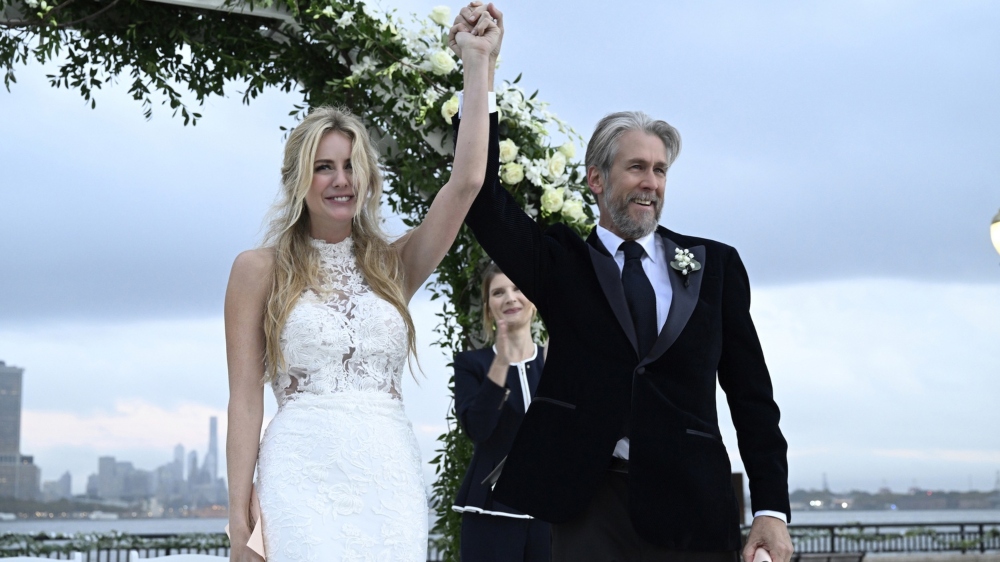
ATL: Let’s delve deeper into the “Connor’s Wedding” episode and how you collaborated with your DP, Patrick Capone, and the cast on things like blocking and choreographing the dialogue.
Mylod: A lot of it was 4-5 years in the making. We’ve evolved a candor and mutual trust over all four seasons so that a lot of what we do now is almost unspoken. Pat and I start talking before each new season with a kind of retrospective about what we’ve done that we thought worked well and what perhaps didn’t work so well, or what we could evolve further in the forthcoming season. We exchange various images for key scenes and moments that we know are coming up so that the dialogue and exchange of imagery start very early at the beginning of each season.
The specifics of Episode 3 were really about creating a ballet, if that’s not too pretentious, between [the] camera and the actors. It’s one that we have evolved quite well over the past few years, but it needed to be taken to a whole new level to achieve this idea that I wanted to, at some point, shoot the entire kind of what I call Scene 11, because that’s what it is in the script.
It’s a 28-page emotional sledgehammer, really, as the siblings learn of Logan’s demise. I wanted to find a way of stringing all that together, but I didn’t know how to, because we shoot on film, and even with a 1,000-foot roll of film, that only lasts 10 minutes, and this scene was lasting half an hour. So, in talking with the cast and specifically with Patrick about my desire to do that, everybody then set about solving the problem.
Pat worked with his camera operators and his whole camera team to hide camera rolls on three or four different levels of the ship, and we approximated where the camera operates and where the action would be when we would need to reload and stationed a camera somewhere out of view in that vicinity so that the operator could affect the switch as seamlessly as possible whilst the other camera was still rolling so that we never missed a moment of the performance. The actors, the cast, the crew, Patrick — everybody just rose to the occasion so beautifully. I’m really proud of it.
ATL: Yes, it was fantastic. And, as you said, you’ve worked with Jesse and the cast from the very beginning, so talk a bit more about collaborating with them.
Mylod: I mean, total joy is the short answer, Hillary. The evolution of our collaboration has been kind of not hard-fought. We all went through Season 1 together, kind of finding what the show was going to be, what the tonal balance would be and could be, and what the parameters were.
And for me, I think it was around Episode 6, an episode that Andrij directed so beautifully in Season 1, where we really found what the show was. And we took that a stage further at the end of Season 1 in the last two episodes when I directed Tom and Shiv’s wedding. And that was the first time we found scenes and opportunities to really dig into the emotional lives of the characters.
Specifically, in scenes between Tom and Shiv discussing the restrictions of marriage and Tom being sideswiped by Shiv’s desire to have an open marriage. We suddenly had a way to move beyond ironic deflection into a genuine emotional interaction with the characters. And once we discovered that portal, once we got into Season 2 and beyond, we were able to excavate that and explore that more together, to just get more intimate and find more context for the character’s behavior.
And that was obviously starting with Jesse’s brilliant writing, but all of us were just so creatively curious to dig into those characters and not give way to any kind of complacency. Even when the show started to become really quite popular, it always felt like we were all after the same thing, all exploring the same moments, the same character dynamics, the same tonal tightropes, and that was glorious. I hope it’s not a once-in-a-lifetime experience, but it certainly feels like it could [be] in the moment when you have so many creatively excellent colleagues all pushing up the same hill.
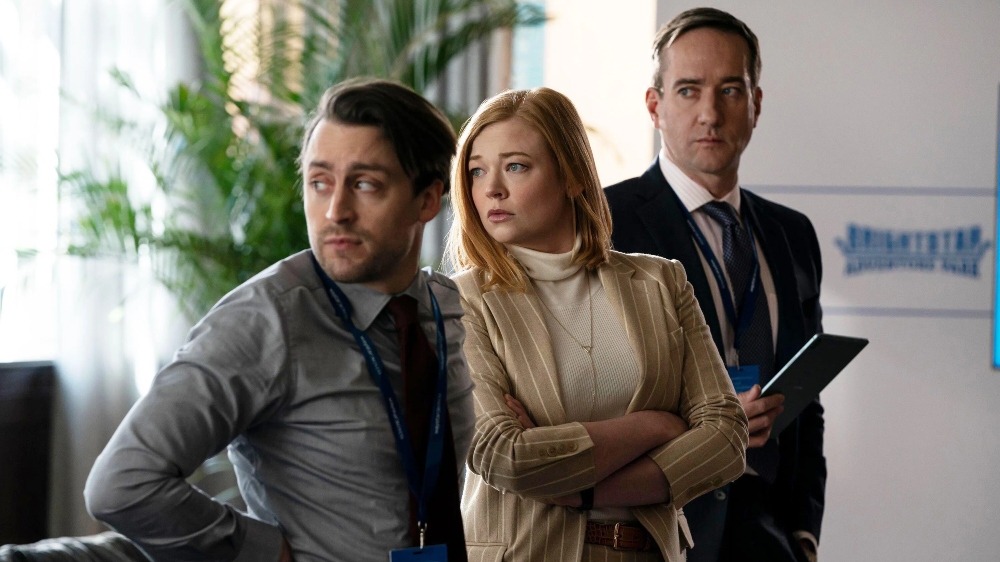
ATL: As an executive producer yourself, and having directed nearly half of the show’s 39 episodes, let’s talk about that climactic series finale and how viewers were left with some huge surprises and complicated emotions.
Mylod: Yeah, it was terrifying [laughs]. With any series finale, whether this is actually true or not, it feels like it has an almost kind of outsized influence on how the show will be remembered. We’ve all had our discussions about series finales that we all think have been brilliant and others that haven’t. Those that haven’t have sometimes felt somewhat tarnished and perhaps very unfairly [so] in many cases because people have felt that they didn’t — and I don’t like the expression — “stick the landing.”
So Jesse, myself, and all our gangs felt a tremendous responsibility to create a finale that felt like we’d done our characters justice, if you like, and done the whole arc of the series justice in terms of how we did it. We just dug in, the same as we’ve done, hopefully, over the four seasons, really.
First of all, Jesse, as he has done many times, wrote the most exquisite words, so we were set up with this beautiful script and then it became really about doing our thing [and] just diving into every single moment and never letting that tension and intensity let up.
I suppose if there was one bear trap I was particularly concerned about, it was this idea of the finale unconsciously giving the characters their final moment, [with it] being a little more saccharine or holding on a moment a bit too long. [Although] we shot it almost entirely logically, we were all sort of full of emotion. As the season and the series drew to a close, I felt it very important to keep a cold eye on the satirical bite of the show and not to give in to sentimentality, and that was very hard to do.
There were certain scenes, specifically, where the siblings come ’round for the sticker auction held by Connor at Logan’s apartment, and they wander into the dining room and find the video playing of the iPhone recording of Logan’s dinner from a few months prior.
That was such a tricky day, and we had to shoot so much material that day. We’d shot the dinner party itself in the morning. Katrina, our graphics producer, had done a very quick turnaround on it so we could play it back in the room to the actors for the first time without them having ever seen it, and we were ready to shoot.
They were just crying and I was, too. I couldn’t say “cut” at the end of it. I was so overcome unexpectedly. I was completely hijacked by that emotion, but trying to keep that sadness at the end of this particular collaboration with these brilliant actors and crew, [and] trying to keep that separate from a cold, laser-focus on the script and the intensity of that, was a real challenge.
ATL: Speaking of the huge emotions that scene engendered, how far in advance did you know about the death of Logan Roy?
Mylod: I knew about Logan’s death quite a long time before, perhaps about a year before, just through private conversations with Jesse about where we were going with the series, generally. He’d had this idea — “What if it happened early in the season, or what if it happened almost off-camera” in that emotionally tortuous way from the siblings’ point of view that they’re so apart from him now — they’re stuck on a boat at Connor’s wedding. He’s 35,000 feet somewhere over Greenland and the irony of that. It just seemed like a brilliant idea, almost, to create such an intense anti-climax, if you like, and a surprise that felt so bold. So that thought was in Jesse’s head in the writing [for] quite a long time before it really solidified into a script.
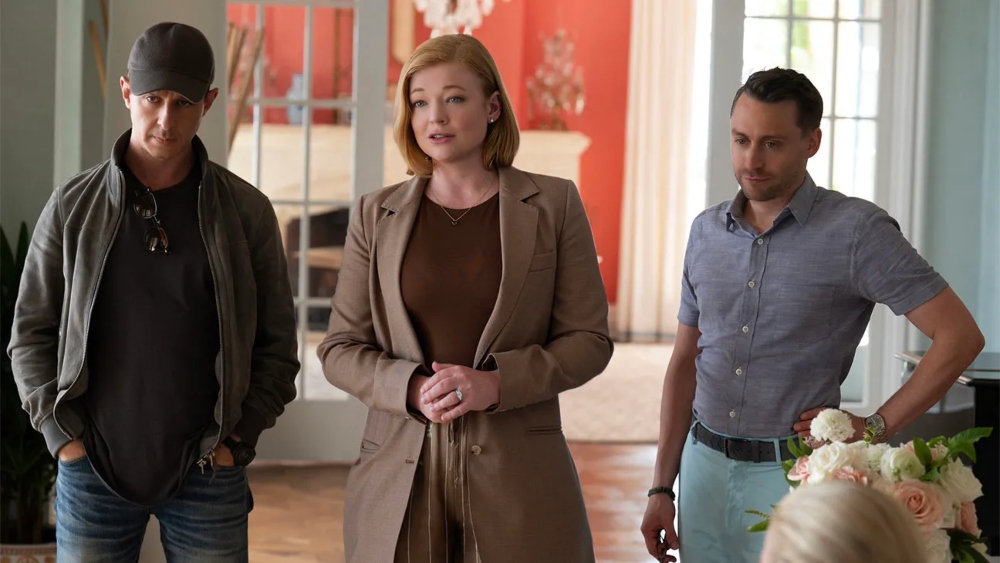
ATL: What was it like for you directing the eulogies at Logan’s funeral?
Mylod: Shooting at St. Ignatius Church on Park Avenue in New York was another kind of emotional high point for me [among] a lot of high points [during] the season. It was the perfect location. I really wanted to shoot there. It had all that Catholic grandeur and a beauty to it and a great scale, but they only had a couple of days available. It’s a very busy church [laughs], but I was desperate to shoot there.
So I used a lot of the same craft techniques that we used in Episode 3 for Connor’s wedding with multiple cameras, and I staged the funeral like it was a live funeral, which I know is a bit of an oxymoron. And so we basically set it up so that we would run without stopping, i.e. we would reload cameras as we went from the moment the hearse pulled up, to all the eulogies, to the point where everybody exited the church in one unbroken take.
This kind of creative highbrow element was to, again, give the cast the ability to completely immerse themselves in that whole sequence on a more kind of low-ground practical element. It also meant that it gave me a healthy chance of actually getting the sequence covered sufficiently in the very short time we had available.
Almost everything that you see in terms of those main eulogy performances, specifically Kieran’s breakdown and Sarah’s brilliant work, and Jeremy’s, was almost all taken from the first take. We shot a number of takes, I can’t remember how many, specifically, but I knew they were locked and loaded emotionally, so I made sure that we got the cameras in for close coverage on the early takes, and that kind of pulled back subsequently for the reactions and the various other coverages that one needs.
So what it did was [it] allowed me to actually kind of employ, or rather revisit, some very early skills that I learned as a live television show director back when I lived in London and worked at the BBC.
I did a live variety show called Noel’s House Party, which had about 8-10 cameras and various feeds. It was a live one-hour show with all the bedlam that goes with that, which gives me such respect for the Saturday Night Live crew [since] I know how hard that is. We set up a kind of mini-television gallery in the back room of the church with about four or five monitors and all the various film cameras on each monitor with myself and Patrick, the director of photography, in direct ear communication to the [camera] operators.
And we ran it almost like a live event, with Patrick and I saying, ‘Okay, camera three, move into close-up. Camera four, swing around, get me the president. Camera five, move back to tracking soft camera left coming to 15 mil length.’ You can imagine the adrenaline of that was fantastic, but in allowing the flow of that action to happen like that, you could really feel the immersion of the whole cast and that whole church full of people.
ATL: Oh, I absolutely could. And it’s so enlightening to hear you explain how you ran it like it was live, so thank you for describing that. You also mentioned your early jobs, but I wanted to ask how you would compare your experiences directing on another legendary HBO series, Game of Thrones, with your experiences on Succession.
Mylod: I often find when I finish one project that I will choose the next project to be as different as possible. And then, of course, I look back and go, ‘Oh, actually there are explorations of power and family,’ and something I failed to kind of [connect] the dots with at the time. So, in their DNA, [they] have a lot in common, and a lot in a physical sense. They’re both brilliantly written by brilliant creators with brilliant casts, both of whom were genuinely a total pleasure to work with.
Game of Thrones, for me, was a fantastically steep learning curve, which was one of the reasons I desperately wanted to join the show. I’d never done anything of that scale before. And yet the key part of why I was so attracted to the writing on the show was David [Benioff] and Dan‘s [Weiss] ability as writers to homogenize intimacy and scope in such a beautifully complete way.
We bonded over our shared favorite scene of the show at that point, which for me was from Season 1, a two-hander between the King and Cersei, where they talked about the failure of their marriage and their bed chamber. And it couldn’t have been a more intimate scene. I thought it was a really devastating emotional scene that they could do that. And then to move into the most epic battle scene [showed me] that was [a] skill that I needed to learn.
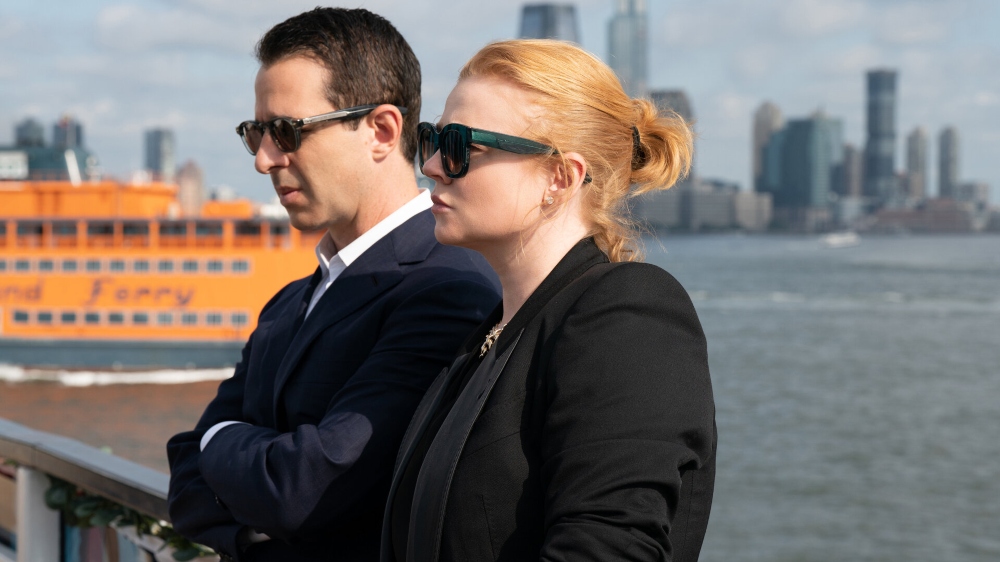
ATL: Speaking of your other projects, I really enjoyed The Menu last year and the shocking ending of that brilliant satire on ultra-fine dining. What did you bring with you to that film from your years of experience directing television, and once you finished that film, what did you learn from the experience that you brought back with you to the world of television?
Mylod: I could probably do a half hour on that question [laughs], but I’ll try to be a bit more succinct… I think what I took to The Menu was just an ongoing and evolving feeling that performance and writing [are] everything. Get the script right.
I think Michael Caine said decades ago that the three things that make a good movie are the script, the script, and the script. I do think there’s such huge truth in that. Working with Will Tracy, my brilliant collaborator whom I also worked with on the “Tern Haven” episode of Succession [the fifth episode of Season 2] was a joy. We just worked and worked and worked to get that script as good as we could, and then [we] really just put performance first. I knew if I got the tone of [the] performances right, the craft elements of satirizing the food, satirizing the way we fetishize the food, all those other art elements and craft elements to the film, I knew we could nail that if we got the tonal performance right.
I’ve been working perhaps a little more consciously over the past few years on my right obsession with the way that Robert Altman worked with his cast — let’s do the script. But then the coverage, in terms of the way the cameras interact with the actors, will be different. Every single take will be more organic. The actors have leeway and then [the] full expectation of improvisation and tonal exploration of any moment so that it feels like it’s going to be loose.
Perhaps the danger is that if one gets too improvisational, then it can feel slack when I needed a very tight tension to that film. So there was a balance to be found there, which in terms of working with such a brilliantly talented and intelligent cast, we could talk about that dynamic and those tensions and the need to find a very, very specific tone.
Hopefully, we got that. But I think performance first and writing first. Actors and writers are the key to everything for me in terms of what I took from The Menu back into Succession. Coming out of that into Season 4, really just the double-down of just wanting to fully explore every moment. Don’t leave any stone unturned. You have such a limited short time on set with that cast and with that crew and with that writing to really dig into and get the best out of any moment and never give into any kind of complacency, however that might manifest itself. And that’s not necessarily carried over from The Menu, but it’s a thing that I’ve evolved [over time]. I’ve had more failures in my time to know that if I’m gonna fail in the future, it won’t be for lack of trying.
ATL: You mentioned that performance and writing are the keys to everything, so as a creative person in the industry right now, with the two strikes going on, what are your biggest concerns?
Mylod: My biggest concern is that they get the result that they deserve and need. It’s a bit of a no-brainer [given that] the way we consume and package content over the past few years has revolutionized so quickly, and yet the way we compensate those artists for their work has not. There’s a basic imbalance there and it needs to be addressed. For me, it’s as simple as that.
ATL: With everything you’ve put in over four seasons, and after Shiv and Tom rode off rather unhappily into the proverbial sunset, what would you like Succession‘s legacy to be?
Mylod: I would love people to just look back and just be as amazed as I was that we could take those characters through how they were when we watched that opening episode of Season 1, [when] they were so despicable and so kind of hateful and entitled, and yet by the time we got to the end of Season 4, they were breaking our hearts. If people look back on that evolution with the same kind of wonder that I do, then I’ll be really happy.
All four seasons of Succession are now available on HBO and streaming on Max.


